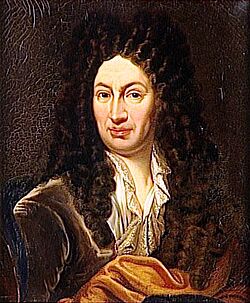Jean Chapelain facts for kids
Quick facts for kids
Jean Chapelain
|
|
|---|---|

An anonymous portrait of Chapelain
|
|
| Born | 4 December 1595 Paris, France |
| Died | 22 February 1674 (aged 78) Paris, France |
| Occupation | Critic, poet |
| Nationality | French |
| Period | Grand Siècle |
| Literary movement | Neoclassicism |
| Notable works | "Sentiments de l’Académie sur le Cid" "La Pucelle" |
Jean Chapelain (born December 4, 1595 – died February 22, 1674) was a French poet and critic. He lived during a time called the Grand Siècle, which means "Great Century" in French. Chapelain is most famous for helping to create and organize the Académie française. This was a very important group for French language and literature. He was respected as a critic, but his long poem about Joan of Arc, called "La Pucelle," was made fun of by another writer, Nicolas Boileau-Despréaux.
Contents
Early Life and Learning
Jean Chapelain was born in Paris, France. His father wanted him to become a notary, which is like a legal clerk. However, his mother had other plans for him. She had even known a famous poet named Pierre de Ronsard.
Becoming a Scholar
From a young age, Chapelain worked hard to prepare himself for a life of literature. He learned Greek and Latin from a teacher named Nicolas Bourbon. He also taught himself Italian and Spanish.
Working as a Tutor
After finishing his studies, Chapelain briefly taught Spanish to a young nobleman. Then, he became a tutor for the two sons of Sébastien Le Hardy. Le Hardy was a very important official in France. Chapelain stayed with this family for 17 years. During this time, he managed their money and became known for his great potential, even though he didn't publish much.
A Writer's Journey
Chapelain's first published work was an introduction for a poem called Adone by Giambattista Marino. This poem was printed and published in Paris.
First Published Works
After that, Chapelain translated a Spanish novel called Guzmán de Alfarache by Mateo Alemán. He also wrote four odes, which are types of poems. One of these poems was written for Cardinal Richelieu, a very powerful figure in France.
Rules for Plays
Around 1632, Chapelain had a talk with Cardinal Richelieu. He explained how important it was for plays to follow certain rules. These rules were about keeping the story's time, place, and action unified. It's said that this idea was new to the Cardinal and other poets at the time.
Because of his ideas, Chapelain received a pension, which was like a regular payment. He also became an active member of the newly formed Académie française. He helped create the plans for the grammar and dictionary that the Academy would work on. He also wrote the "Sentiments de l’Académie sur le Cid" at Richelieu's request. This was a critical review of a famous play called Le Cid.
The Epic Poem
In 1656, Chapelain published the first twelve parts of his long poem about Joan of Arc. It was called La Pucelle. He had worked on this poem for twenty years! Six editions of the poem sold out in just 18 months. However, this was the end of his fame as a poet. Another writer, Nicolas Boileau-Despréaux, later wrote harsh criticisms that made Chapelain's poem seem like a failure.
A Respected Critic
Even though his poem wasn't a success, Chapelain's reputation as a critic remained strong. In 1663, he was asked by Jean-Baptiste Colbert, a minister to the king, to write a report about writers of the time. This report was meant to help the king decide who should receive money and support.
Fair Judgments
In this report and in his letters, Chapelain showed his true talent. His prose writing was much better than his poetry. His criticisms were known for being fair and generous. He was also very knowledgeable and kind. He helped many writers, including the young Jean Racine, who received a helpful pension thanks to Chapelain.
Chapelain's wide range of interests is shown in his work De la lecture des vieux romans (published in 1870). In this work, he praised the chanson de geste, which were old French epic poems that many people had forgotten.
Chapelain turned down many honors. He was known for being unselfish. Some stories, like those from Gilles Ménage and Tallemant des Réaux, claimed he became a miser and hoarded a lot of money. However, his unselfishness makes these stories seem unlikely.
See also
 In Spanish: Jean Chapelain para niños
In Spanish: Jean Chapelain para niños
- Guirlande de Julie

